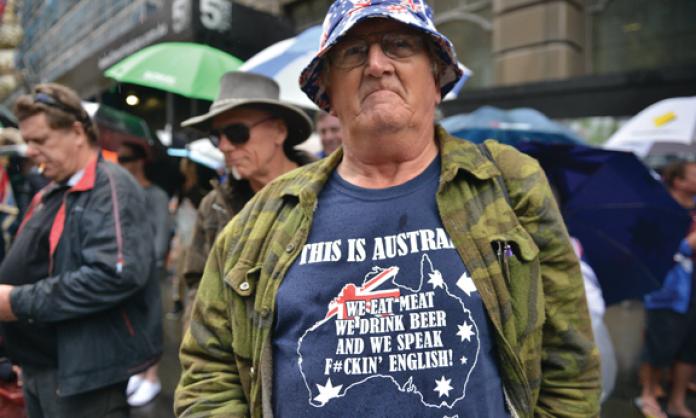If any further proof were required that conservative politics has nothing to offer people but virulent racism and jingoism, Malcolm Turnbull and immigration minister Peter Dutton’s joint press conference on citizenship changes would have to be it.
Their proposal to significantly increase the barriers to citizenship – including most absurdly the introduction of a “values test” – is a clear attack on immigrant rights that, if implemented, would set a dangerous precedent for citizens and non-citizens alike.
As with the infamous White Australia policy, under the government’s proposal citizenship applicants would have to pass an English reading, writing and listening test, which they are currently not required to do. They would also be subject to longer waiting times and would have to prove that they have attempted to “integrate” into Australian society.
The current test would be overhauled and people given fewer opportunities to pass it. It has also been suggested that applicants would be subject to background checks to confirm whether or not they subscribe to “Australian values”.
For the government, this is primarily an exercise in political theatre. It is an unashamed attempt to emulate the tub thumping racism that has worked so well for Donald Trump, Marine Le Pen and Pauline Hanson. In the absence of any compelling social vision, politicians of all stripes are increasingly turning to racist nationalism to save their own political careers and to provide a sense of national unity for a dissatisfied and divided populace.
AN ATTACK ON MUSLIMS
Despite the coded rhetoric aimed at keeping migrant leaders and the constituencies they represent on side, no-one is under any illusions about who these changes are directed at: Muslims. The draft questions to do with “Australian values”, released by the Department of Immigration, leave little doubt about this:
Does Australia’s principle of freedom of religion mean that it is permissible to force children to marry? In Australia’s multicultural society, under which circumstances is it permissible to cut female genitals? While it is illegal to use violence in public, under what circumstances can you strike your spouse in the privacy of your own home? Under what circumstances is it appropriate to prohibit girls from education?
These questions, aimed primarily at focusing domestic attention at a foreign enemy, are nothing more than a crude appeal to the pervasive racist tropes about Muslims and their supposed backward attitudes regarding women’s rights. This same stereotype has been used to drum up support for the invasion of Afghanistan, along with other wars in the Middle East that have killed and displaced hundreds of thousands of people, as well as to infringe on the civil rights of Muslims in the West with regard to dress, freedom of expression and freedom of association.
GROSS HYPOCRISY
That the prime objective of this exercise is to generate hostility to a cultural enemy is highlighted by the extreme difficulty Turnbull and Dutton have in defining exactly what these “Australian values” actually are. Turnbull claims they are “the rule of law, democracy, freedom, mutual respect, equality for men and women. These fundamental values are what make us Australian”.
But not a single one of these values is unique to Australia. Nor is the combination of all five of them. Furthermore, the concept of “values” tends to suggest qualities that define a population and endure over time. Yet the values Turnbull described have a fairly flimsy basis in historical and contemporary cultural fact.
Universal suffrage only exists because wealthy Australians were forced to extend the vote to the less wealthy, women and Aboriginal people. The rights of Australian women have a similar story: only relatively recently have women fought for and won equal pay, the right to work after getting married, the right to apply for a bank loan and the right to divorce. And for all the talk of how a core Australian value is disapproval of domestic violence, it was only in the 1980s that rape in marriage was recognised as a crime in law. As late as the 1990s the leader of the Liberal Party, Alexander Downer, felt at liberty to joke about the issue in public.
It will no doubt come as a surprise to workers that “mutual respect” is a universal value in Australia, given the frequency with which they are denigrated as thugs for daring to join a union or complain about wage cuts. Likewise LGBTI people, who have to go to New Zealand to get married because those people now harping on about how “mutual respect” and “freedom” voted down various marriage equality bills four times in the last eight years.
And it will be interesting to hear how Peter Dutton reconciles his commitment to mutual respect with his pointed absence from Parliament during the historic 2008 apology to the Stolen Generations, and his infamous “mad fucking witch” text about a female journalist.
THE MYTH OF AUSTRALIAN VALUES
In fact, there are no values that can legitimately be advanced as ones that unite Australia. As the opinion editor at the Daily Telegraph whined, “the Americans have ‘life, liberty, and the pursuit of happiness’. The French have ‘liberté, égalité, fraternité’. And what do we have?”
Countries that have been formed through revolutionary struggle, led by a modernising bourgeoisie cognisant of the need to unite the population behind a common objective have tended to adopt slogans and philosophies which in their time have been progressive and can legitimately be deemed national values of a sort.
Australia has no such heritage. The values of the establishment have until very recently consisted of blind loyalty to the British Empire – a foreign power with an extremely dubious commitment to freedom and democracy. Conservative prime minister Stanley Bruce summed up these establishment values in the 1920s:
“It is necessary that we should determine what are the ideals towards which every Australian would desire to strive. I think those ideals might well be stated as being to secure our national safety, and to ensure the maintenance of our White Australia Policy to continue as an integral portion of the British Empire.”
These values were not universally shared. Among the poor and labouring classes, a quasi-national folklore has existed in opposition to the values of the establishment, characterised by egalitarianism and support for the underdog. This sentiment is epitomised by the valorisation of Ned Kelly: a disloyal Irish criminal who robbed the rich for a living. But this is as much an expression of class identity as it is an expression of national values. And a version of it exists among similar layers in many societies other than Australia.
Attempts to promote Australian values therefore tend to be fraught. Liberal prime minister John Howard’s efforts to incorporate a reference to “mateship” into the preamble of the constitution in the late 1990s quickly degenerated from a conservative offensive in the culture wars to a widely ridiculed farce. The idea was eventually quietly shelved.
Unconvincing as Turnbull is on any topic other than fine wine and harbour views, his effort at racist nationalism feels more like a corporate management exercise than it does a successful effort at promoting jingoism. And just as major corporations adopt “core values”, which they pontificate about in mission statements and frame on lunch room walls, the purpose is the same: to paper over the unequal and exploitative relationships at the heart of any company, and by extension any nation. A manufactured sense of unity and hatred for an outsider is the aim of this project. It must be resisted.









